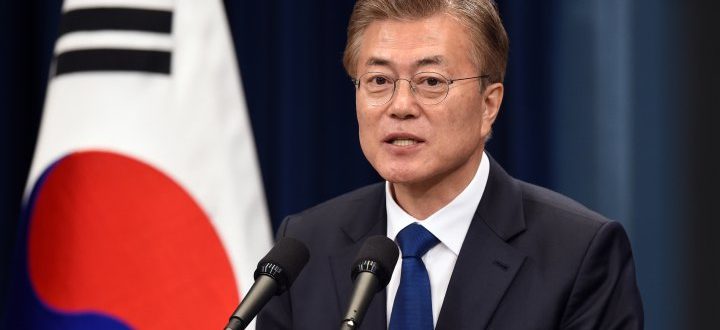Korea – back from the brink; small steps forward
Relations with the external nuclear powers, USA, China, and Russia , will remain difficult, but the “rules of the game” which have held since 1954 may continue if care is taken to strengthen the modalities of crisis management.
| Suggested Reading | Conflict Background | GCCT |
By Rene Wadlow
The election on 9 May 2017 of Moon Jae-in as president of the Republic of Korea may have applied the brakes to a dangerous increase in tensions between the two Koreas, the USA, China, Japan, and Russia. Moon Jae-in, 64 years old, formerly a human rights lawyer, has long been a political figure, having come in second in the 2012 presidential elections just behind Ms Park Geun-hye, recently ousted on corruption changes, thus provoking early elections. There are 10 or so candidates in the elections for president, the person receiving the highest percentage of votes is elected. Thus the 41% of the votes for Moon Jae-in is a strong victory, due in part to his popularity among young voters and also a reaction to the levels of corruption in the administration of his two predecessors, Park and Lee Myung-Bak.
Moon follows in the tradition of Presidents Kim Dae-Jung and Roh Mu-hyun. Kim was awarded the Nobel Peace Prize for his “Sunshine Policy” of tension reduction with North Korea. Moon had served as a chief administrator for Roh. During the decade of the Kim and Roh administrations from 1998 to 2007, inter-Korean conciliation and cooperation made unprecedented progress. The highpoint was the 15 June 2000 North-South Joint Declaration signed in Pyongyang by Kim Jong-Il for the Democratic People’s Republic of Korea and Kim Dae-Jung for the Republic of Korea.
The Declaration set out reunification as a chief goal along with economic cooperation and building “mutual confidence by activating cooperation and exchanges in all fields, social, cultural, sports, public health, environmental and so on.” Furthermore “The North and South agreed to hold dialogues between the authorities as soon as possible to implement the above-mentioned agreed points in the near future.”
While there was a second inter-Korean summit between Kim Jong-Il and Roh Moo-hyun again in Pyongyang in October 2007 reaffirming the spirit of the joint declaration of 2000, the road has been down hill since 2000 to the point that the image of a car stopping just at the brink of a cliff is more than a poetic image.
Now, there may be a possibility of small steps that build confidence between the two Koreas and that do not overly worry the USA and China who watch events closely and who may do more than watch. The one program that did follow the 2000 Declaration was a greater possibility for short meetings among family members from North and South, many of whom have been divided since the 1950-1953 War. Such meetings do not undermine either system and have a humanitarian character. Cultural cooperation could also be undertaken since cultural events are of short duration. Cooperation for work in industrial zones has had a very up-and-down history and needs to be restarted almost from nothing today.
The one security issue on which some progress might be made concerns the Law of the Sea and the maritime boundaries of the two States, the sea limits having created tense confrontations between North and South Korean war ships in the past.
It is unlikely that any progress will be made in the foreseeable future concerning denuclearization of the Korean Peninsula or unification. Small steps are probably the “order of the day”. However Track II – informal discussions which are not negotiations but a clarification of possible common interests and areas of joint action- can be helpful.
Relations with the external nuclear powers, USA, China, and Russia , will remain difficult, but the “rules of the game” which have held since 1954 may continue if care is taken to strengthen the modalities of crisis management.
Rene Wadlow is the President of the Association of World Citizens, an international peace organization with consultative status with ECOSOC, the United Nations organ facilitating international cooperation on and problem-solving in economic and social issues.
The views expressed in this article do not necessarily reflect the views of TransConflict.



















